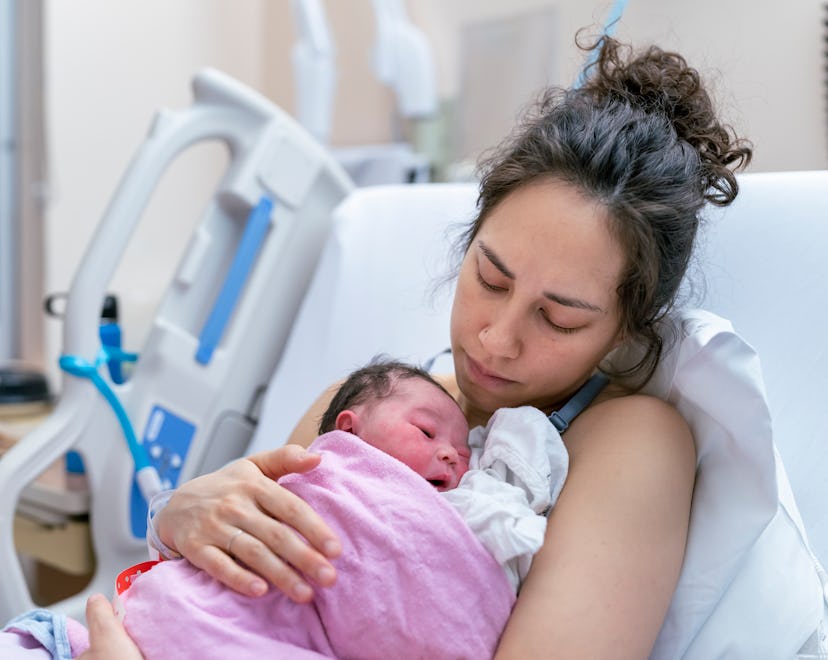That Post-Birth Ouch

Everything You Need To Know About Postpartum Cramps
How to get a little comfort, and when to call your doctor.
Nothing compares to delivery, of course, but painful cramping after birth can come as a cruel surprise. You’re sitting there, snuggling your newborn, and — ouch. Though postpartum cramping is normal, it’s not the greatest feeling ever. However, postpartum cramping should pass relatively quickly, and there are a few basic things you can do to get relief from the discomfort (and they sound pretty familiar) while you wait for it to subside.
What are postpartum cramps?
Much like the cramps that accompany your period, postpartum cramping “is a painful or uncomfortable sensation in the pelvis, back, or lower abdomen caused by the muscular portion of the uterus contracting,” explains Dr. Kristen Phillips, an OB-GYN at Corewell Health. You’ll probably begin to notice them in the very first hours after delivery.
“Postpartum cramping is good,” adds Dr. Ilina Pluym, an Assistant Clinical Professor of Obstetrics and Gynecology at UCLA Health Santa Monica. “It helps the uterus go down to its normal size.”
What causes postpartum cramping?
Cramps after birth are a normal — if unpleasant — part of your body’s recovery process. “Cramping in the postpartum period is felt usually due to the uterus contracting and shrinking — also known as uterine involution,” says Phillips. “This is a very important physiological response that helps decrease bleeding during the postpartum period.”
As with pregnancy, and delivery, there is a wide range of what is considered “normal” when it comes to postpartum cramping. You may barely notice postpartum cramps, or they may be quite uncomfortable. If you’re still in the care of a healthcare provider — whether it is a doula or doctors and nurses in a labor and delivery ward — don’t hesitate to ask about anything that may be going on with your body. “Having a history of multiple previous births and/or breastfeeding can cause worsening of cramps,” Phillips says, adding that “certain medications that help decrease postpartum vaginal bleeding can also increase cramping.”
How long do postpartum cramps last?
Postpartum cramping should be most intense in the first days, and at most a week or two after delivery. “Most postpartum cramping occurs, off and on, for one to two weeks but can last longer depending on the person and birth experience,” Phillips says. You should expect it to ease up as days go by, however. “If you're having heavy bleeding with the cramping, it should never get worse. So, from the delivery — after the first couple days — things should gradually get better and better,” Pluym says. If you’re still experiencing postpartum cramping at three weeks post-delivery, both suggest that it may mean a check-in with your healthcare provider would be wise.
Pain management options
Just because postpartum cramping is normal and even a good thing doesn’t mean you have to just sit there and suffer. The same things you’d do to relieve period cramps should offer relief from postpartum cramps.
Pluym and Phillips both suggest the following to get relief from postpartum cramps:
- Motrin or ibuprofen is the best choice for postpartum pain relief. “You might have to buy it because you haven’t been able to use Motrin during pregnancy,” Pluym explains. “But, postpartum, it really is the best analgesic.” Phillips agrees, adding, “The most effective drug class to relieve postpartum cramps are NSAIDs (nonsteroidal anti-inflammatory drugs) such as ibuprofen or naproxen.”
- Heating pads or hot water bottles
- Warm showers
- Ginger tea or capsules. “There are some trials supporting ginger as a pain reliever for menstrual cramps as well which can be taken in the form of capsules or tea,” Phillips explains.
- Drink plenty of water
Postpartum cramping: When to call your doctor
Even from the very first hours postpartum, “cramping that is unexplained or unrelieved with Tylenol and ibuprofen is more likely to be abnormal,” says Phillips. “Cramping associated with other worrisome symptoms like fever, heavy vaginal bleeding, or a foul odor also may be indicative of an infection or complication. If you are uncertain, it is always best to ask your provider.”
“If you’re a couple weeks out, and you suddenly start having heavy, new cramping that’s worse than it was before, or heavy new bleeding, that’s a step in the wrong direction,” Pluym says, adding that this would warrant a call to your healthcare provider right away.
Experts:
Dr. Kristen Phillips, an OB-GYN at Corewell Health
Dr. Ilina Pluym is an Assistant Clinical Professor of Obstetrics and Gynecology at UCLA Health Santa Monica Maternal Fetal Medicine
This article was originally published on